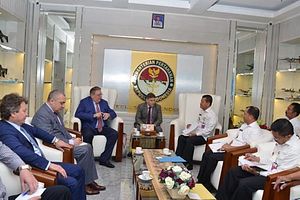Last week, news surfaced regarding progress with respect to a follow-on request for amphibious vehicles by Indonesia’s military. While specifics remain unclear, the development nonetheless spotlighted Jakarta’s ongoing efforts to develop its defense capabilities that continues on under Indonesian President Joko “Jokowi” Widodo who secured a second term last year amid lingering uncertainties and challenges.
Indonesia, Southeast Asia’s largest state, has continued its longstanding efforts to strengthen its limited military capabilities to contend with a wide array of internal and external security challenges in a sprawling archipelago, and one of the aspects of this is the development of amphibious vehicles. News has surfaced periodically with respect to Indonesia’s efforts to strengthen its capabilities in recent years, with a case in point being a notable agreement with Russia’s JSC Rosoboronexport, which is part of the Rostec State Corporation, last year.
Last week, reports surfaced that the Indonesian government had approved a follow-on order request for the Marine Corps (KORMAR) to procure more amphibious vehicles. The request for a 4633 trillion rupiah ($280 million) for a batch of BT-3F amphibious vehicles for the Indonesian Marine Corps (KORMAR) was reportedly approved by the House of Representative’s commission on defense, intelligence, and foreign affairs (known as Komisi 1).
No additional details were publicly provided by the Indonesian government about the specifics of the potential purchase. But IHS Jane’s noted in its report of the development that according to documents provided to it from an anonymous Indonesian Navy source, the money will be drawn from defense export credit facilities. Jane’s also added that the aforementioned allocation will be used to fund the procurement of up to 79 BT-3F units, and that the vehicles will be ordered from Russia’s JSC Rosoboronexport “once formalities are in place.”
The report itself came as little surprise considering the fact that this is a capability that Indonesia has been looking to invest in and that this constitutes a follow-on order in a relationship that Jakarta has long had. And as with other developments of this type, the focus will now shift on how exactly progress of this will be made up to the actual transfer of the equipment and its use. Nonetheless, how exactly it evolves in the coming weeks and months will be important to watch amid wider developments, including Indonesia’s defense picture as the country continues to contend with COVID-19 and the broader state of Indonesia-Russia relations, where some earlier transactions have been slowed due to sanction-related concerns tied to U.S. policy.

































